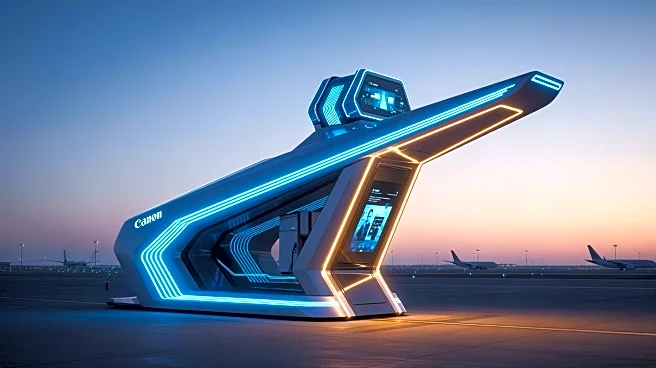What's Happening?
Skymark Refuelers, in collaboration with World Fuel Services and Clay Lacy Aviation, has introduced the largest all-electric aircraft refueler in the United States. The 7,000-gallon EV Refueler features
a zero-emission drivetrain and is designed to pump sustainable aviation fuel at Clay Lacy Aviation's Van Nuys Airport FBO. The refueler includes advanced features such as smart monitoring systems and compliance with National Fire Protection Association standards. Skymark Refuelers is also developing a 10,000-gallon electric refueler, further advancing its commitment to sustainable aviation solutions.
Why It's Important?
The introduction of the largest electric jet refueler marks a significant step towards sustainability in the aviation industry. By reducing emissions and promoting the use of sustainable aviation fuel, Skymark Refuelers and its partners are contributing to environmental goals and setting new standards for ground service equipment. This development aligns with broader industry efforts to reduce carbon footprints and enhance operational efficiency. The deployment of electric refuelers could influence other companies to adopt similar technologies, driving innovation and sustainability across the aviation sector.
What's Next?
As Skymark Refuelers continues to develop its electric refueler technology, the company may explore additional partnerships and collaborations to expand its market presence. The successful deployment of the 7,000-gallon refueler at Van Nuys Airport could lead to increased demand for sustainable refueling solutions at other airports. Regulatory bodies and industry stakeholders may also play a role in promoting the adoption of electric refuelers, potentially leading to new standards and incentives for sustainable aviation practices. The ongoing development of the 10,000-gallon refueler will further enhance Skymark's capabilities and market position.
Beyond the Headlines
The launch of the electric jet refueler highlights the growing importance of sustainability in the aviation industry, with implications for environmental policy, corporate responsibility, and technological innovation. As companies seek to reduce their carbon footprints, the adoption of electric refuelers may lead to changes in infrastructure, workforce training, and regulatory compliance. This shift towards sustainable practices also underscores the need for collaboration and investment in green technologies, as the industry navigates evolving consumer expectations and environmental challenges.










